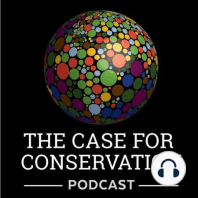55 min listen

23. How alarmed should we be about the environment? (Matt Ridley)
23. How alarmed should we be about the environment? (Matt Ridley)
ratings:
Length:
51 minutes
Released:
Jun 5, 2022
Format:
Podcast episode
Description
This episode is about environmental alarmism. Alarmism means exaggerating danger and thereby causing needless worry or panic. These days the media is flooded with proclamations and predictions of ecological catastrophe. There is no doubt that our environmental challenges are many, and huge, and they certainly do present dangers. But are they being seen in the context of broader developmental challenges and associated trade-offs? Or in the context of humankind's past achievements, and our ability to adapt? And is alarmist rhetoric the best way to motivate action to deal with them? Among the people offering answers to questions like these, is this month’s guest on The Case for Conservation Podcast, Matt Ridley.Matt was, until he retired last year, an elected member of the UK Parliament’s House of Lords. He’s been been writer and/or editor for The Economist and The Wall Street Journal, among other publications, and his non-fiction books have sold more than a million copies. They include "The Rational Optimist", "The Evolution of Everything", "How Innovation Works" and, most recently, "Viral: The Search for the Origin of COVID-19". His 2010 TED talk, "When Ideas Have Sex", has been viewed more than 2 and a half million times, and he’s spoken on various other popular forums including, quite recently, the Jordan Peterson Podcast.Links to resources:Mattridley.co.uk - Matt's website, where all his other books, his blog, and other information can be foundThe Rational Optimist: How Prosperity Evolves - Perhaps the most relevant of Matt's books to our conversation - published in 2010How Innovation Works: Serendipity, Energy and the Saving of Time - another of Matt's books relevant to our discussion - published in 2020Viral: The Search for the Origin of COVID-19 - Matt's most recent book, co-authored with Alina Chan (2021)When ideas have sex - Matt's TED talk in 2010, which has had more than two and a half million viewsEmissions – the ‘business as usual’ story is misleading - 2020 article by Zeke Hausfather and Glen Peters in the journal, "Nature", about RCP 8.5Time stamps:02:50: Matt's response to a Guardian article about climate change terminology06:59: Species conservation and reports of species loss due to to climate change13:35: A counsel of despair15:32: The possible influence of funding in environmental rhetoric17:40: How innovation helps conservation24:40: How ecological footprint calculations may be misleading; finite resources34:23: The Jevons paradox35:42: The evolution of lightbulb technology; prehistoric technology without innovation38:12: Which environmental issues are being neglected?42:14: Invasive species as a driver of biodiversity loss45:32: Is deforestation the cause of the Covid-19 pandemic?48:27: Is there a link between environmental alarmism and theories of Covid-19 origins?Visit www.case4conservation.com
Released:
Jun 5, 2022
Format:
Podcast episode
Titles in the series (45)
9. Is there still racial discrimination in conservation? (Gillian Burke) by The case for conservation podcast